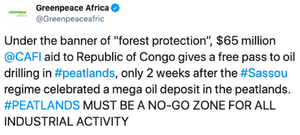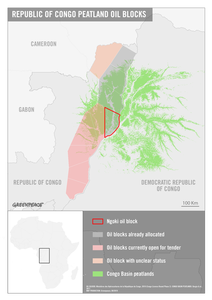Johannesburg, 4 September 2019 – Greenpeace Africa denounces the surprise signature of a CAFI Letter of Intent (LoI) by the presidents of France and the Republic of the Congo, giving a free pass to drill for oil in the peatlands [1].
The LoI between the Central African Forest Initiative (CAFI) and the Republic of the Congo was signed [2] only two weeks after the Congolese regime celebrated the “discovery” of a peatland oil deposit that it said could quadruple national oil production. The accord calls merely for “minimization of the impacts” of oil drilling in peatlands.
Furthermore, the LoI’s language about “forest governance” reflects decades of donor PR for the multinational logging industry and fails to address the deeply rooted corruption in the sector. [3].
“The agreement’s ban on large-scale drainage, if implemented, would do nothing to keep oil and gas companies out. Although the current status of Total’s Cuvette Centrale oil blocks – one in the heart of the peatlands, the other covering the totality of a National Park – is unclear, Macron will have an excellent opportunity to clarify it today – in his meeting with the CEO of Total!” said Irène Wabiwa Betoko, Greenpeace Africa Senior Forest Manager. “Greenpeace Africa firmly denounces this agreement – peatlands must be a no-go zone for all industrial activity,” Wabiwa Betoko concluded.

(See Greenpeace Africa’s English and French tweets from this morning)

(Downloadable map of peatland oil blocks in the RoC produced by Greenpeace Africa)
ENDS
Contact :
Irène Wabiwa Betoko, Greenpeace Africa Senior Forest Manager,
Mobile: +243 976 756 102, Email: [email protected]
Tal Harris, International Communications Coordinator for Greenpeace Africa,
Mobile: +221 776 73 04 96, Email: [email protected]
Comments :
[1] The Cuvette Centrale peatlands straddling the two Congos constitute the world’s largest tropical peatland complex, covering 158,887 km² and containing more than 30 billion tons of carbon. If the peatlands were to be disturbed and drained, the equivalent of three years of global CO₂ emissions could be released. See:
Nature: http://www.nature.com/nature/journal/v542/n7639/full/nature21048.html
[2]CAFI PR:
http://www.cafi.org/content/cafi/en/home/all-news/republic-of-congo-and-cafi-sign-65-million-dollars-letter-of-int.html
Entretien entre le Président de la République et le Président de la République du Congo”
https://www.elysee.fr/emmanuel-macron/2019/09/03/entretien-entre-le-president-de-la-republique-et-le-president-de-la-republique-du-congo
[3] EIA report: “Toxic Trade: Forest Crime in Gabon and the Republic of Congo and Contamination of the US Market”:
https://eia-global.org/reports/20190325-toxic-trade
Greenpeace report: Cut from Congo: Industrial logging and the loss of intact forest landscapes in the Congo Basin”
https://cdn.greenpeace.fr/site/uploads/2017/10/Greenpeace_IFL_report_final.pdf
